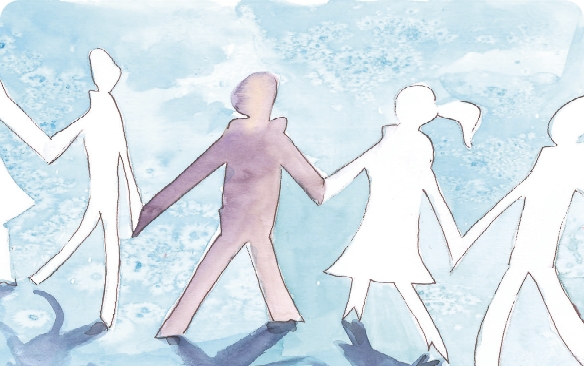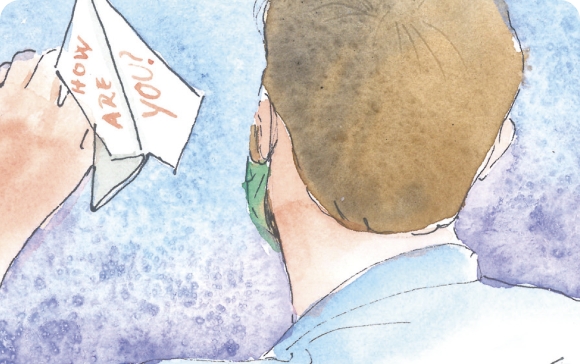
Sincer despre schizofrenie
Ghid dedicat îngrijitorilor și membrilor familiei
Sincer despre schizofrenie – ghid dedicat îngrijitorilor și membrilor familiei, vă va ajuta să vă conturați și să vă fundamentați rolul de îngrijitor și vă va ajuta să rezolvați dilemele și să vă răspundeți la întrebări prin cunoștințe medicale, perspective practice, remedii eficiente și sprijin pentru îngrijitori.
Pe lângă faptul că sunt experți medicali în domeniul lor, autorii acestei cărți vorbesc în numele tuturor celor care se confruntă cu schizofrenia, indiferent de rolurile pe care le jucăm.
CAPITOLUL 1
Despre schizofrenie
Aceste pagini sunt destinate să ofere îndrumări despre cum să vă ajutați persoana dragă să trăiască o viață mai bună și să navigheze prin provocările de zi cu zi ale schizofreniei. De asemenea, își propun să ofere informații utile despre cum să acceptați și să vă adaptați la această nouă situație din viața dumneavoastră, cum să deveniți o punte între persoana de care aveți grijă și profesioniștii din domeniul sănătății și, nu în ultimul rând, cum să aveți grijă de sine de-a lungul acestei călătorii pline de provocări, dar adesea recompensatoare.
CAPITOLUL 2
Cei 3 ”C” ai remediului pentru stigmatizare: Confirmare, Consimțire, Contribuție
Nu sunteți singuri!
Alte familii se confruntă cu temeri, dificultăți și provocări similare și se pot simți izolate sau neînțelese. Luați legătura cu ei. Alăturați-vă unui grup de suport sau unei asociații a îngrijitorilor.
Au același obiectiv: de a avea un impact pozitiv asupra viețiicelora de care au grijă. Cel mai important, discutați cu specialiștii din domeniul sănătății și implicați-vă activ în conversație.
CAPITOLUL 3
A Înfrunta versus a Renunța
Majoritatea persoanelor cu schizofrenie rămân cu rudele sau se întorc la ele, iar acest lucru schimbă permanent viața de zi cu zi a întregii familii.
Schizofrenia schimbă, de asemenea, planurile de viitor ale persoanei dragi, dar datorită îngrijirilor corespunzătoare și eforturilor comune ale întregii familii, multe dintre aceste planuri se pot realiza.
Mulți îngrijitori simt că și-au pierdut planurile, visele și așteptările legate de persoana lor dragă. De asemenea, se tem că situația nu se va mai întoarce niciodată la felul în care era înainte. Aceasta este o reacție firească, iar recunoașterea acestor sentimente și acceptarea lor poate facilita de fapt o confruntare cu succes pe termen lung cu boala.
De-a lungul acestui proces, puteți avea o gamă largă de emoții, cum ar fi furia, vinovăția, tristețea, amorțeala, singurătatea, dar și iritabilitatea, probleme de somn, pierderea apetitului și dificultăți de concentrare.
O modalitate de a accepta aceste emoții este să vă permiteți să treceți prin ciclul emoțional complet – de la amorțeală emoțională la acceptarea noilor circumstanțe și să priviți viitorul dintr-o nouă perspectivă.
CAPITOLUL 4
Îmbunătățiri terapeutice
Deși în prezent nu există un remediu cunoscut pentru schizofrenie, perspectivele pentru persoanele care trăiesc cu această boală se îmbunătățesc constant. Pentru majoritatea pacienților, tratamentul schizofreniei implică o combinație de medicamente și terapia prin discuții, însoțită de instruire socială care îi ajută să se reintegreze în societate. Pe parcursul perioadelor de criză sau intervalelor de timp însoțite de simptome severe, poate apărea necesitatea spitalizării pentru a asigura siguranța, alimentația adecvată, somnul suficient și igiena de bază.
Schizofrenia necesită tratament pe tot parcursul vieții, chiar dacă simptomele se ameliorează. În multe cazuri, managementul pacienților cu schizofrenie este gestionat de o echipă condusă de un psihiatru cu experiență și poate include un psiholog, o asistentă medicală psihiatrică, un asistent social și un manager de caz care va coordona îngrijirile. Având în vedere complexitatea bolii și faptul că fiecare persoană este diferită, nu există o abordare universală pentru toti. Este important să vă faceți timp pentru a exploara toate opțiunile și pentru a elabora un plan de tratament personalizat, care funcționează cel mai bine pentru persoana dvs. dragă. Obiectivul tratamentului este de a reduce simptomele, de a diminua probabilitatea unei recăderi și de a crește calitatea vieții.
CAPITOLUL 5
Cum să-ți accepți emoțiile
A oferi îngrijiri unei persoane cu schizofrenie este o muncă dificilă, care necesită un volum enorm de timp, energie și dăruire. Lăsând deoparte frământările zilnice, faptul de a oferi îngrijiri poate scoate în evidență o largă varietate de emoții.
În calitate de îngrijitor, poți avea EMOȚII POZITIVE, PRECUM ȘI NEGATIVE. Faptul de a avea toate aceste emoții poate deveni ISTOVITOR, iar dacă nu sunt monitorizate minuțios, ele vă vor epuiza.
Ignorarea emoțiilor și însuflarea faptului că trebuie să rămâneți „puternic” pentru persoana dragă sau pentru întreaga familie nu este o soluție. A accepta emoțiile este, de asemenea, MAI SĂNĂTOAS.
Înțelegeți-vă emoțiile și valorificați-le în avantajul dvs. Daca vă oferiți permisiunea de a avea emoții și de a recunoaște faptul că emoțiile nu vă controlează acțiunile, atunci emoțiile negative fie se vor atenua, fie vor fi mai ușor de gestionat. Pe termen lung, aceasta vă va permite să oferiți îngrijiri mai bune persoanei dragi, dar vă va ajuta și să aveți grijă de sine.
CAPITOLUL 6
Ocupația? – Îngrijitor-erou
A fi îngrijitor poate părea o sarcină descurajantă uneori, dar ajutorul este la îndemână. Aici aruncăm o privire practică asupra unora dintre lucrurile pe care le puteți face pentru a vă ajuta pe dumneavoastră și pe ceilalți atunci când aveți grijă de o persoană cu schizofrenie.
CAPITOLUL 7
Aveți grijă și de sine
Îngrijirea unei persoane cu schizofrenie cuprinde o parte majoră a vieții dvs., cu toate acestea, nu ar trebui să o acopere în totalitate. Timpul rezervat pentru sine vă va ajuta să apreciați de la o parte ceea ce faceți.
CAPITOLUL 8
Managementul schizofreniei în urma pandemiei COVID-19
Prezentul capitol conține informații utile despre pandemia COVID-19, despre cum a afectat aceasta persoanele cu schizofrenie și ce puteți face în calitate de îngrijitor, pentru a menține sănătatea mintală și fizică a persoanei dragi, precum și propria stare de bine, dată fiind recenta pandemie prin care am trecut, dar și posibile pandemii din viitor, precum și alte situații similare.










